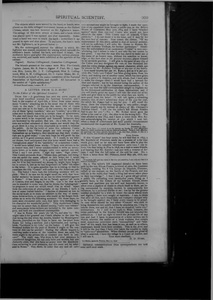< The Kobolds have Come (continued from page 1-163) >
...
A Letter from D. D. Home.
To the Editor of the Spiritual Scientist:
Dear Sir: — A gentleman has sent me some copies of your most excellent journal, the Spiritual Scientist, and I find, in the number of April 6th, a letter from some anonymous “Comte,” attacking me in the usual way of those who “stab in the dark.” In Europe the mere title of Comte does not awe us in the least; on the contrary, we are rather shy of these “great travelers,” who are “comtes,” as a title of, some sort is usually taken by a certain class of adventurers. We also well know that titles arc to be bought. To be sure, in some much to be respected and honored instances, they are bestowed by the powers that are. As a rule, the recipients are neither ashamed of their names, nor would they dis grace them in a way so truly despicable as to seek to mislead the public. As for the letter of mine this unknown Comte has, wherein I say, “When people are vain enough to set themselves up as teachers, they should see that their credentials are in good order,” 1 can only hope he will profit by the advice, as it is good common sense. If I could, in my wildest dream, have anticipated that this letter would have had a “conspicuous place” in the “portfolio,” of a nameless Comte, I would have added these words: “I have ever striven to be an honest man, and I never condescended to write an anonymous letter, or to make charges sotto voce against any one. What I say I can prove.* I sign my name. Sign yours.” This Comte proceeds thus: “Home may, perhaps, not recognize me under the name affixed to this letter, for I never sought his acquaintance.’’ It is, perhaps, well for me he did not, for if he had borrowed my money he might have forgotten to return it, just as he has forgotten(?) to “affix” his name to-the letter. It is quite possible that he is joking, or that he considers the title “Comte” will suffice for the American public. The honor I have had, the following sentence will ex plain: “But if he saw me he might recall me with that ‘wonderful memory' he boasts of, as one he often brushed against in Rome.” It has been my lot to “brush against” all sorts of Comtes, true and bogus, in my life. Can it be that this one is oranded in some way, that he thinks the “photograph” he proposes to send me would recall him to mind? Apart from the collection of photographs of my friends, I have a few of some Italian bandits. I decline to descend so low in the social scale as to make an addition in the way of anonymous letter-writers, or persons who could so far forget them selves as to write the following sentence: “In those days, rumors were circulated sotto voce, that were very damaging to his character for wonderful purity.” This mysterious Comte may not be aware that, in decent society, “sotto voce rumors” and anonymous letter-writers are included in the same category, and both are considered contemptible.
I was in Rome the years ’56, ’58, ’62, and also '75. We might take it for granted our Comte alludes to the year ’62, that being the one when the Jesuits, headed by Monseigneur Merode, prevailed on the Rope to have me banished from Rome for being a medium and a Spiritualist, and having a book, “Incidents in my Life,” on the Index. I will give ten thousand dollars for the poor of Boston if aught to the contrary bf this can be proved! During the official inquiry I, smarting under a sense of the injustice done me, said, “Is there aught in my private life or conduct you have to censure?” The reply was, “Far from it, but your presence is considered dangerous, for not only have you written, but you distinctly state, that you have no power over the manifestations occurring in your presence, and this must not be tolerated in Rome.” Nay, more, in order that any and all sotto voce accusations might be brought to light, I made the question of my expulsion from Rome a public one, in the British House of Commons, May 31st, 1864, and I have “brushed against” more than one real Comte who would not have dared do the same. This Comte says of himself, "I hate publicity,” I do not doubt it in the least, and it may be for the very best of reasons. Now comes the climax. “If my endorsement of this story, added to that of several persons, will not be sufficient, I will refer Mr. Home to Messrs. Rymer and Anthony Trollope, for fnrther particulars.” Doubtless the endorsement of an anonymous “Comte” is very overwhelming, but I refuse to take it, and take the two names he has given. I say that the man who has dared to make use of the name of an honest man, without his sanction or knowl- <... continues on page 1-165 >
* Except in the case of anonymous and infamous letters sent to a poor lady at Geneva, traced to him (D. D. Home) and for which an English officer, a friend of Prince Wittgenstein went to flog him. His behaviour was so cowardly that the officer left in disgust, “without even whipping him a little” adds the Prince who wrote the facts to Col. Olcott.
Editor's notes
- ↑ A Letter from D. D. Home. by Home, D. D., Spiritual Scientist, v. 4, No. 18, July 6, 1876, p. 209
Sources
-
Spiritual Scientist, v. 4, No. 18, July 6, 1876, p. 209


